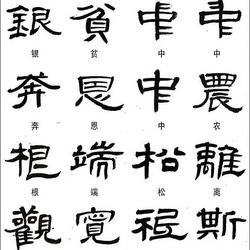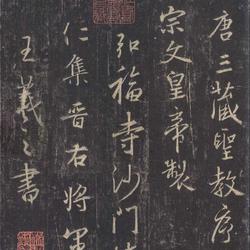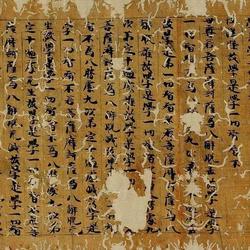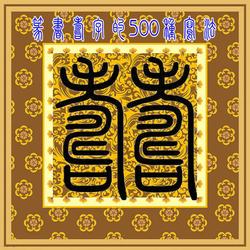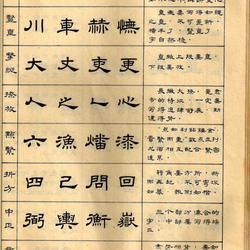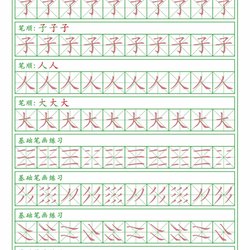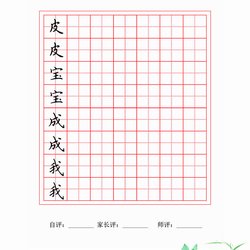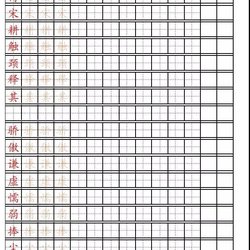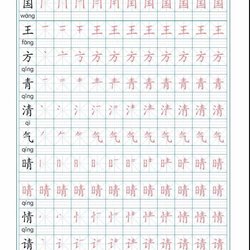Tang Yin (1470-1523) was born in the Yin month, Yin day and Yin time of the sixth year of Chenghua of Emperor Xianzong of the Ming Dynasty. He was named Tang Yin, with the courtesy name Bohu and Ziwei. His nickname was Liuru Jushi, Taohua nunnery master, etc., Han nationality. A native of Wuxian County (now Suzhou, Jiangsu Province). Born into a businessman family, his father is Tang Guangde and his mother is Qiu. They have been smart since childhood. When he was more than 20 years old, his family suffered a series of misfortunes. His parents, wife, and sister died one after another, and his family declined. Under the advice of his friend Zhu Yunming, he concentrated on studying. At the age of 29, he participated in the Yingtianfu public examination and won the first place "Jie Yuan". At the age of 30, he went to He passed the Beijing Examination, but was implicated in a fraud case and was denounced as an official. After that, he decided not to make progress and made a living by selling paintings. In the ninth year of Zhengde (1514), he went to Nanchang for more than half a year at the invitation of King Ning Zhu Chenhao. Later, he realized that King Ning had evil intentions, so he pretended to be crazy and escaped and returned. Life was difficult in his later years, and he died of illness at the age of 54. He was cynical but talented. He was good at famous poems and prose. He was known as one of the "Four Talents of Jiangnan" together with Zhu Yunming, Wen Zhengming and Xu Zhenqing. He also had more famous paintings and was known as one of the "Four Wu Clan Schools" together with Shen Zhou, Wen Zhengming and Qiu Ying.
Shen Zhou composed ten poems with seven rhymes of Luo Hua due to the loss of his son. This is a total of 30 poems in Tang Yinhe's "Luo Hua Shi Album". When he saw the fallen heroes on the ground, he felt sad and expressed his indignation in connection with his own rough experience. This "Poetry of Falling Flowers" is one of Tang Yin's masterpieces of calligraphy handed down from generation to generation. It should be written by him earlier. The pen is round and beautiful, the jade bones are plump and the muscles are rich, the wine is romantic, and it is gentle and elegant.
Various versions of Luohua Poems and Ink Blots
Tang Yin wrote poems about falling flowers many times in his life. The number of poems recorded each time was different, the content was different, and the calligraphy style was also different. The ones currently known are collected in the collections of Suzhou Museum, Liaoning Provincial Museum, Princeton University Art Museum, National Art Museum of China.
Collection of Suzhou Museum, paper album, 34 pages, each page size varies from 27cm x 30cm. A total of thirty poems in seven rhymes were recorded, among which thirteen were collected from the original collection and Shen Zhou's Luohua poems. Seventeen poems are supplements. There is no signature or date at the end of the volume. Later, there were postscripts written by Fang Hao, a Jinshi scholar in the third year of Zhengde, written in Jiajing Bingxu, and Weng Fanggang's postscript written in the second year of Jiaqing. Among them, Weng Fanggang's postscript said: "...the draft of these six thirty poems is very different from the collection. Do you want to revise it yourself?" Yaotian got this from Dumen, with two poems in Zhongque. Returning to the south, I met Jiang Qiu Shi, and there are exactly two poems in Qiu Shi. It seems appropriate..." Weng Fanggang believes that this is a draft, indicating that the collection date is relatively early. At the same time, this album was missing two songs. Add it later. Is Weng's speculation correct? This can be confirmed from the Princeton Collection
"Album of Falling Flower Poems" Suzhou Museum collection part
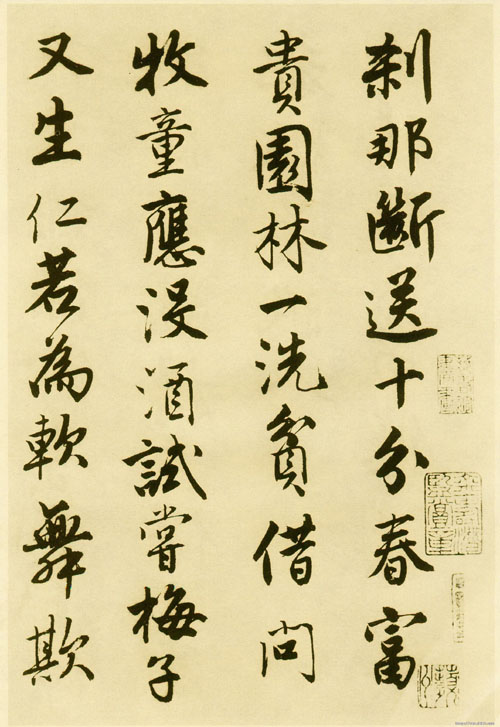
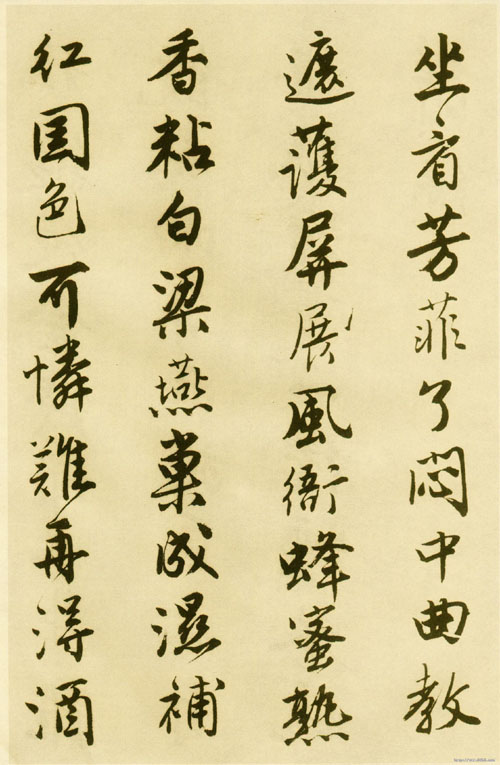
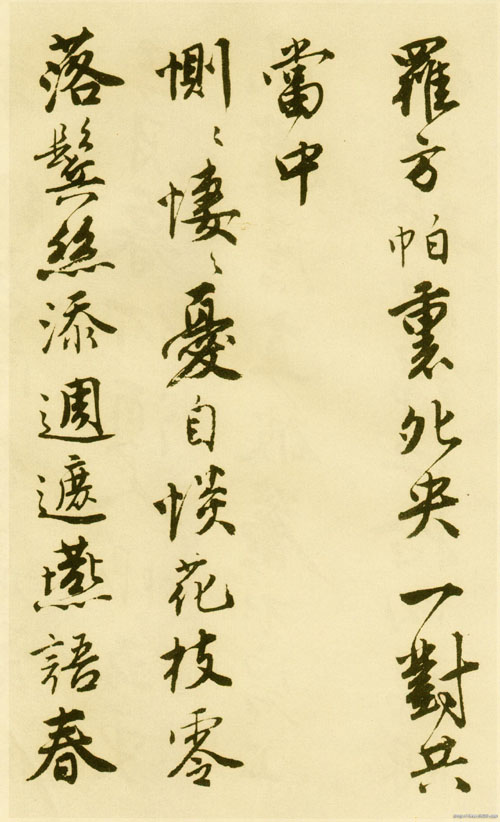
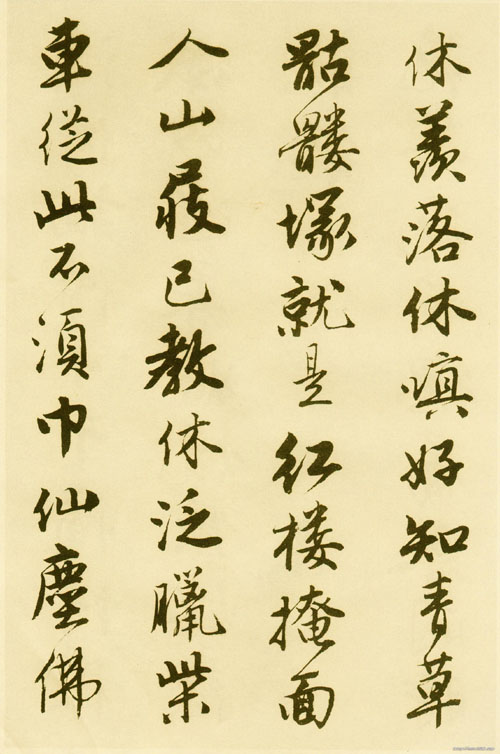
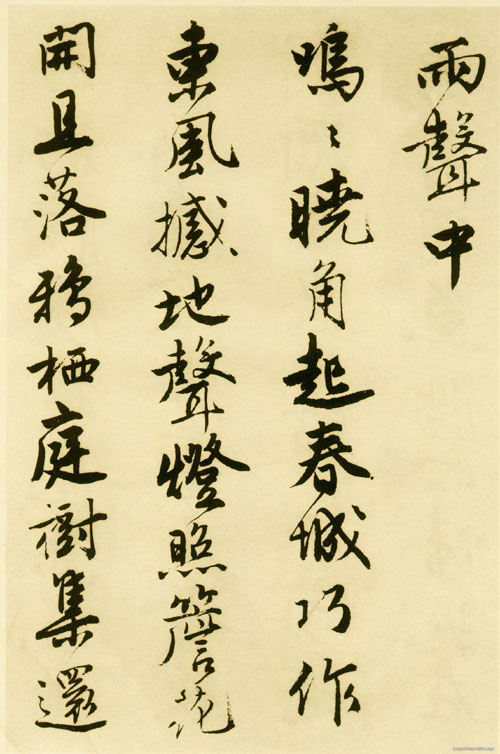
Collection of Liaoning Provincial Museum, long paper scroll, 26.6cmX 406cm. It contains seven rhymes and ten poems, all of which are poems in the supplement to "The Complete Works of Tang Bohu". Tang Yin wrote a postscript after the poem, but the time of writing was not indicated. Mr. Yang Renkai inferred from the postscript that it was written in the year of Heshi, that is, the seventeenth year of Hongzhi (1504), but this speculation is open to question. There is also an inscription and postscript by Gu Wenbin at the back of the volume: "The painting of fallen flowers by Bai Shiweng (Shen Zhou) hates that his poems were lost, and the poem of Liu Ru layman hates that his paintings of falling flowers are also lost. They are combined into one volume by the two families of Hehui. The so-called two wounds of separation, combined They are both beautiful. Renxu summer. ’ This is a postscript from 1862. From this we can know that Shen Zhou and Tang Yin each wrote pictures of falling flowers and wrote poems about falling flowers after the pictures. Later, Shen's poems were lost and Tang's pictures were lost. It was not until the Qing Dynasty that Shen's pictures and Tang poems were combined into one volume. According to Mr. Yang Renkai, the existing drawings of Shen from the Liaoning Museum are dilapidated and dilapidated, and the slope stones are outlined with thick lines, and the thick and light inks are applied without cracking. This kind of painting method is rare in Shen's paintings, so whether this picture is an original work by Shen Zhou still needs further work. research. But Tang Yin's poem about falling flowers is authentic. Tang Yin said in his postscript: "Mr. Ishida chanted ten poems about falling flowers, expressing human emotions and physical conditions, and he used his thoughts to refine his words, surpassing his predecessors... He showed it from time to time. After reading it for many days, he couldn't put it down. Gu Yufang was imprisoned in Linyue and paid his own dues. Looking at Feiying's words, there are those who don't care about the toilet. Reluctantly following in the footsteps of others, politics does not realize its ugliness. As my free time passed, I wrote a small picture to show my interest. "In this passage, there are both memories of the past and an apology for not being ashamed of myself when I was young, expressing my complex emotions when I wrote the Luohua poem. And it can be seen that this poem is inscribed after the picture of falling flowers. It is further confirmed that this volume was written by Tang Yin.
"Album of Falling Flower Poems" Collection of Liaoning Provincial Museum Partial
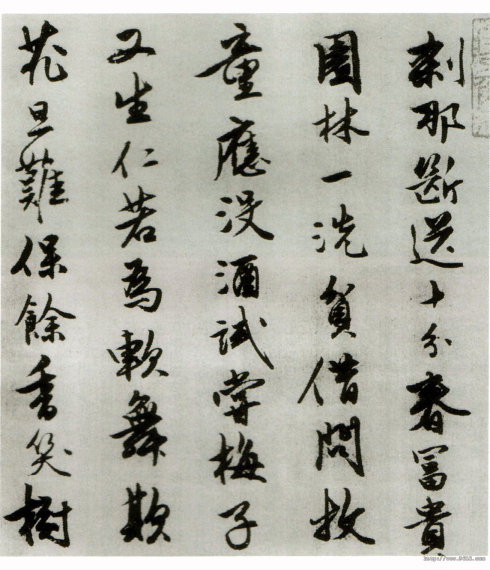
Collection of the Princeton University Art Museum, long paper scroll, 25.1cm x 649.2cm. Twenty-one poems in seven rhymes are recorded, the first eight are supplements, and the last thirteen are the original collection of Luo Hua poems. At the end of the volume, Tang Yin signed "Jinchang Tang Yin Manuscript" without marking the date. There is also a postscript written by Ma Riguan. The words "Tang Yin Manuscript". Just proves it's a draft. This "draft" is of course a transcript. Because the handwriting is very neat. Judging from the style of calligraphy, the Su Bo collection is relatively close to the Princeton collection. Judging from the copy content, both have thirteen poems from the original collection of Luohua poems. Although they are arranged in different orders, the content of these thirteen poems is basically the same. Therefore, the writing time of the Princeton edition and the Subbot edition cannot be very far apart. But never at the same time, because there are some changes in the same poem. For example, there is a sentence in the Princeton edition titled "When spring comes, why do you lean on the railing silently?" and in Su Bo's edition does "When spring comes, why do you lean on the railing silently?"
"Poetry of Falling Flowers" Collection of the Art Museum Affiliated to Princeton University
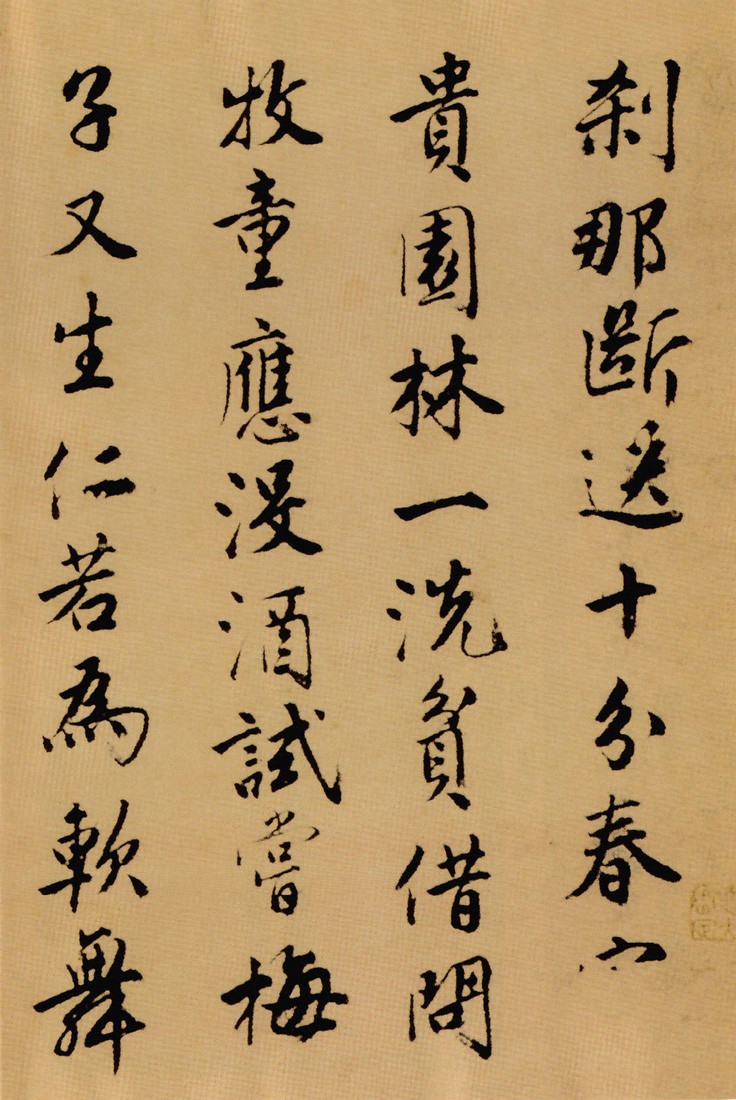
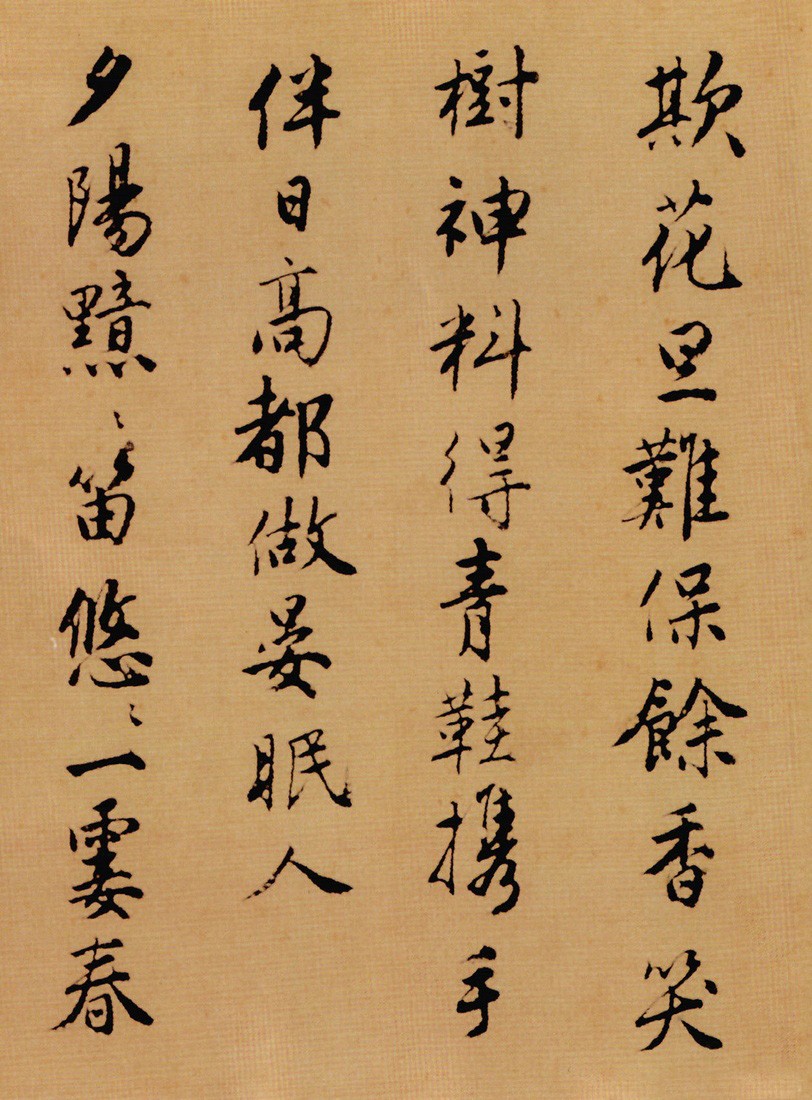
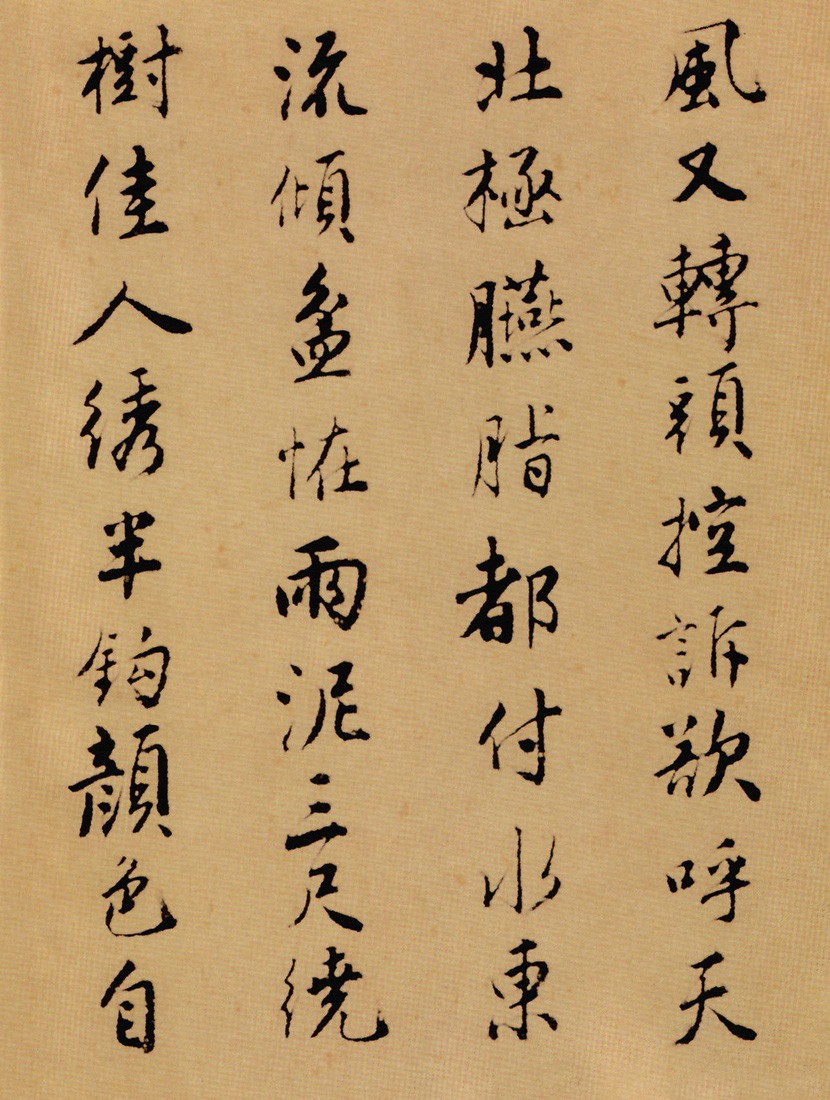
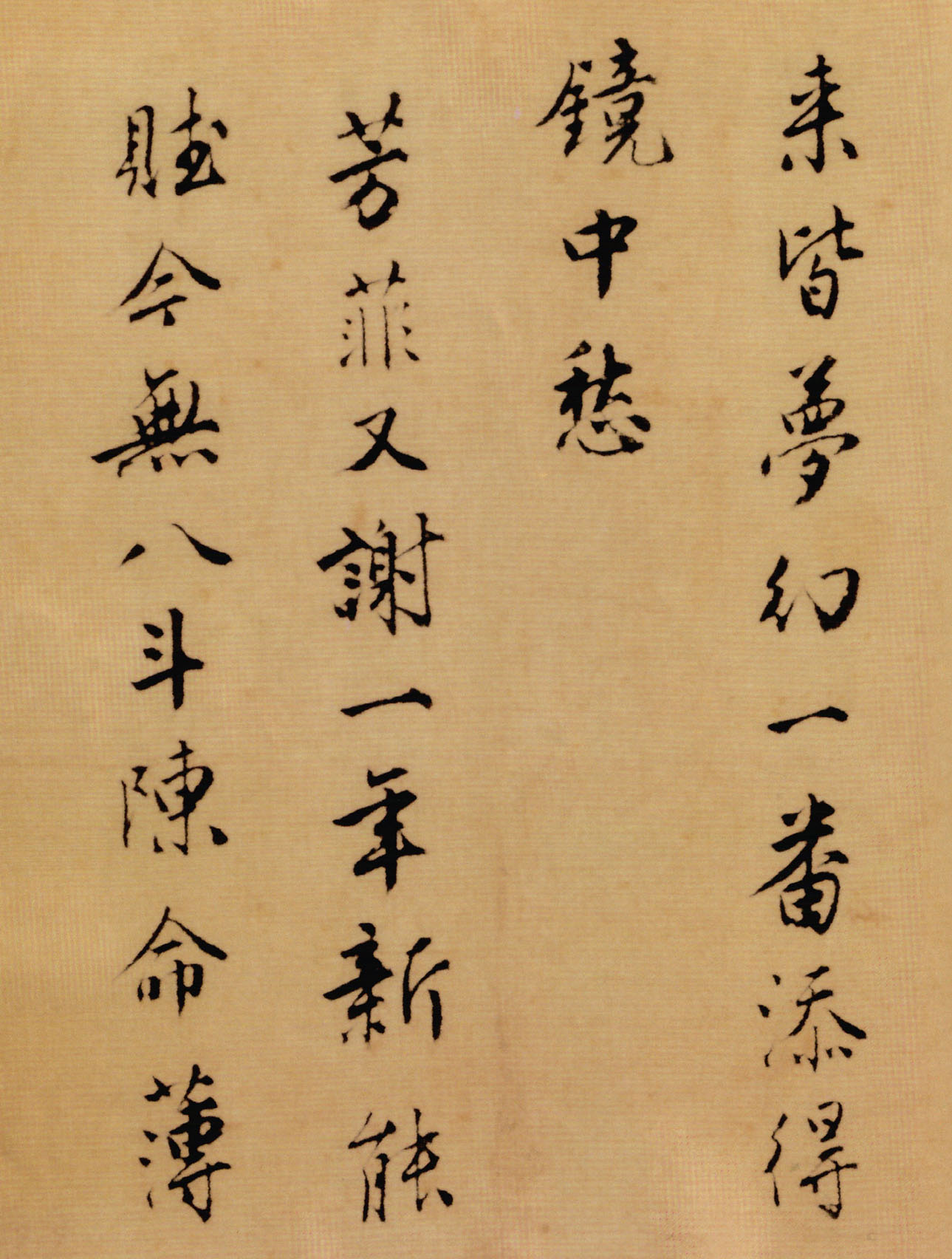
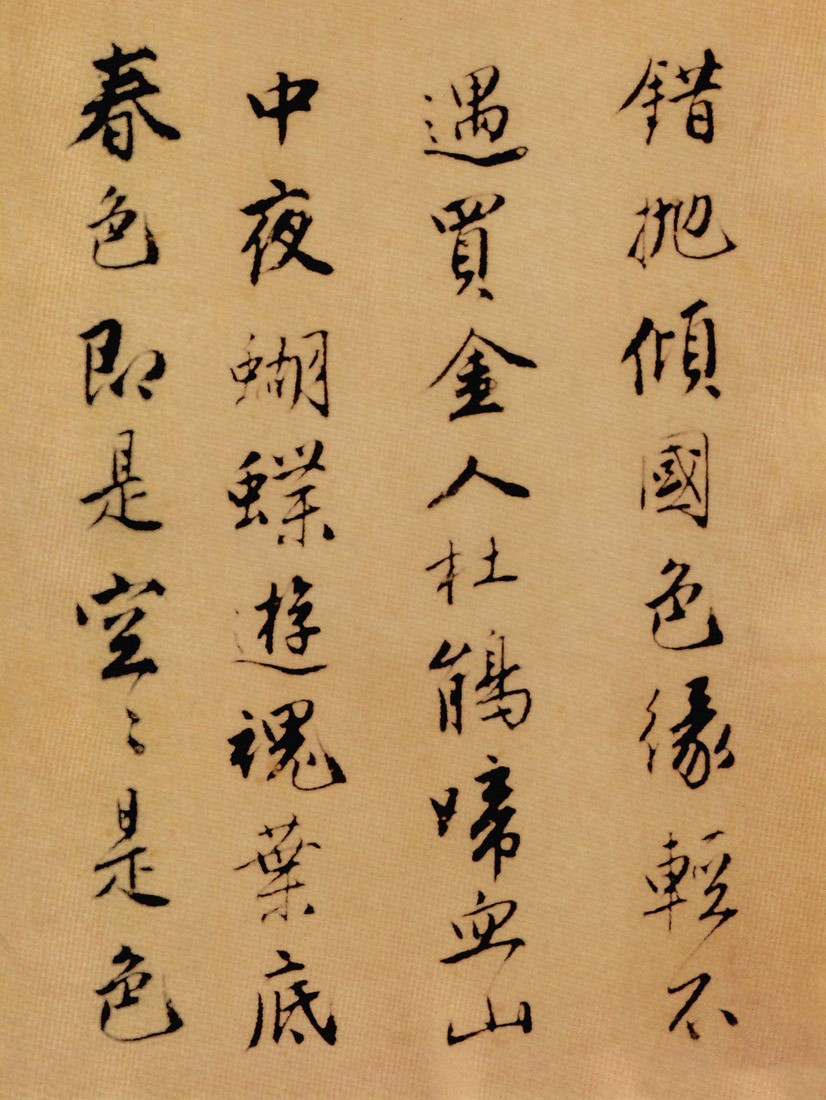
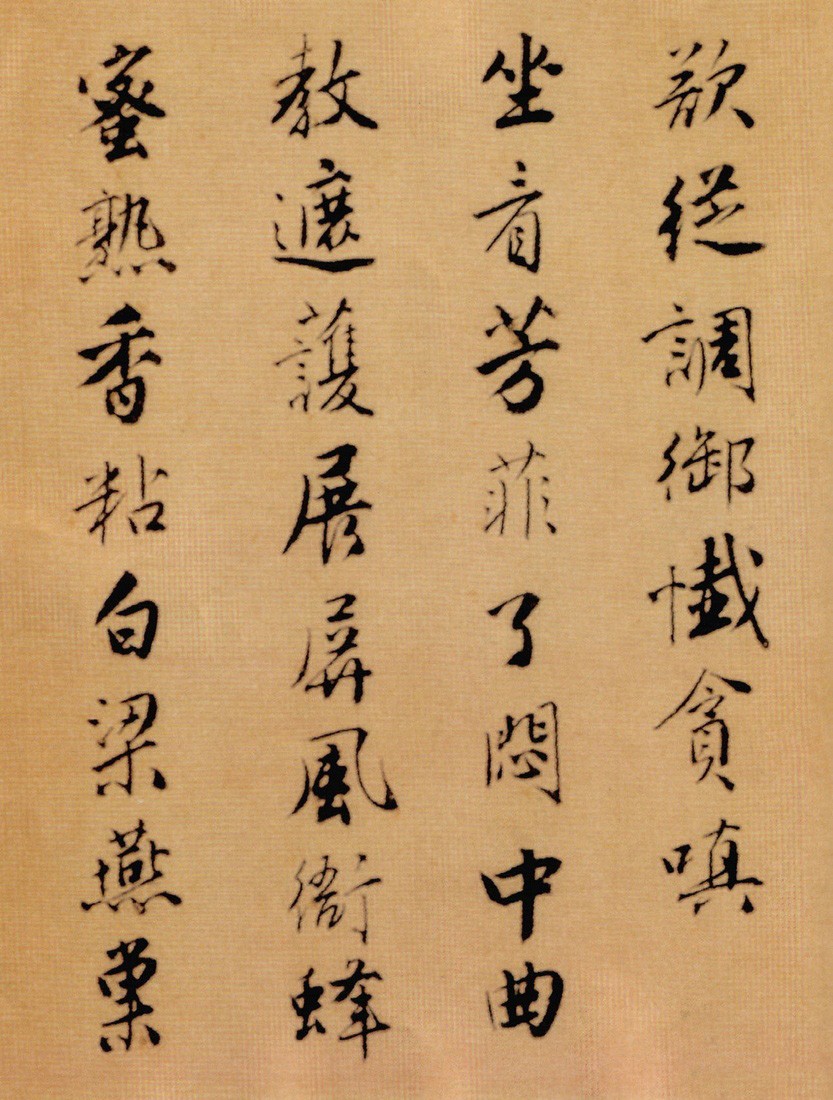
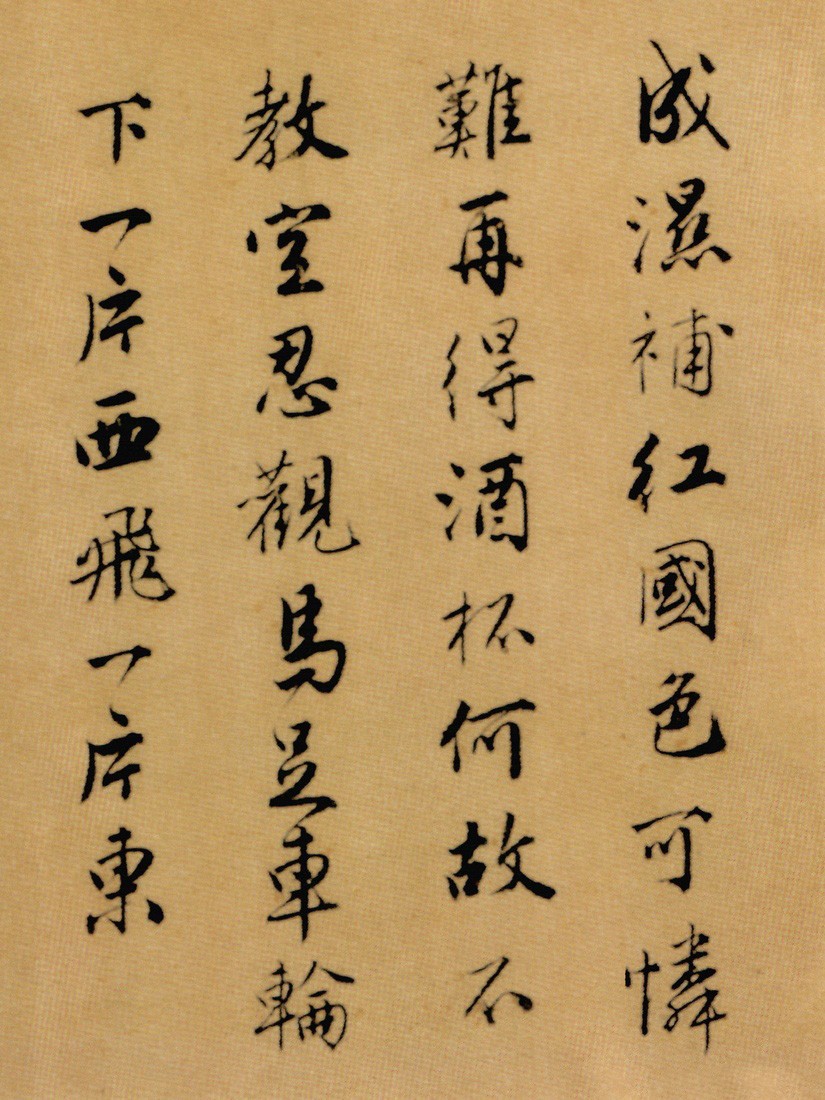
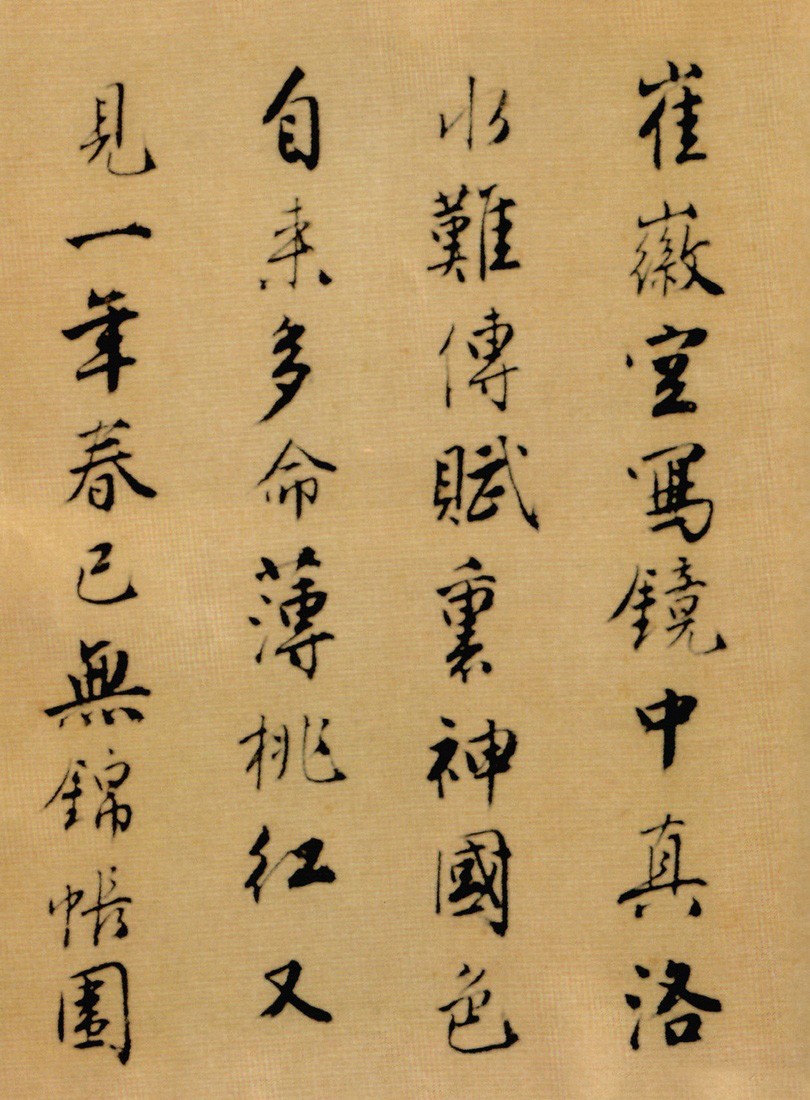
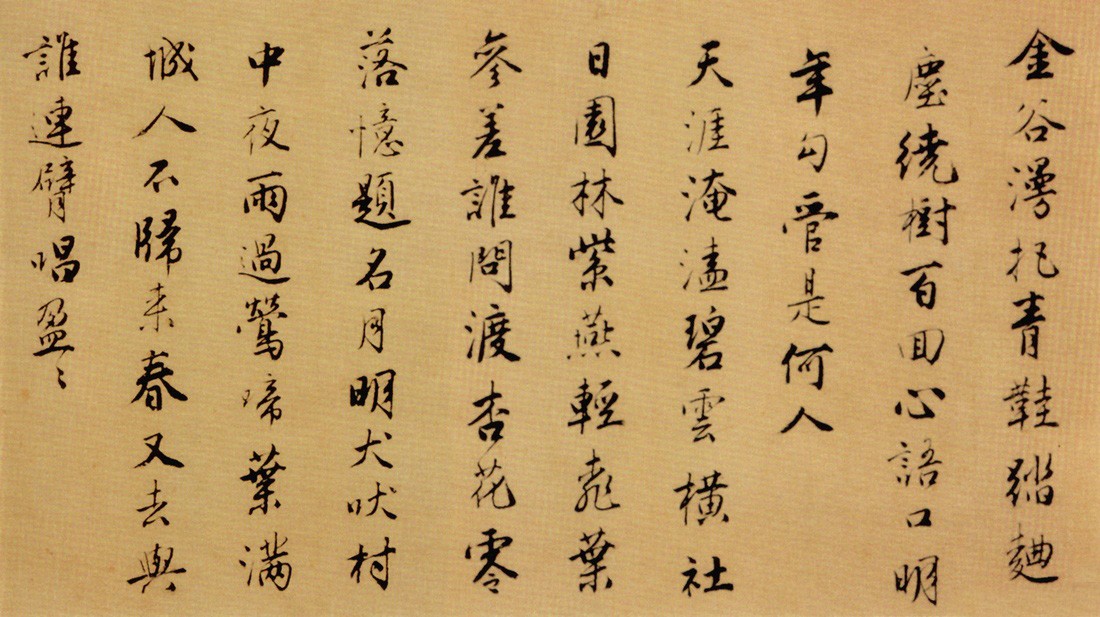
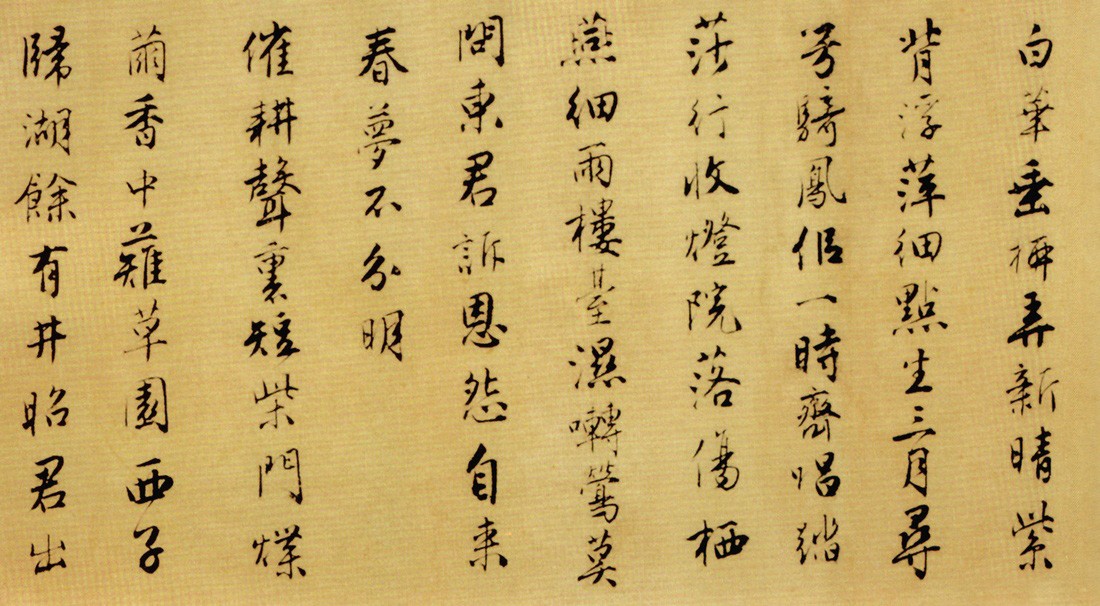
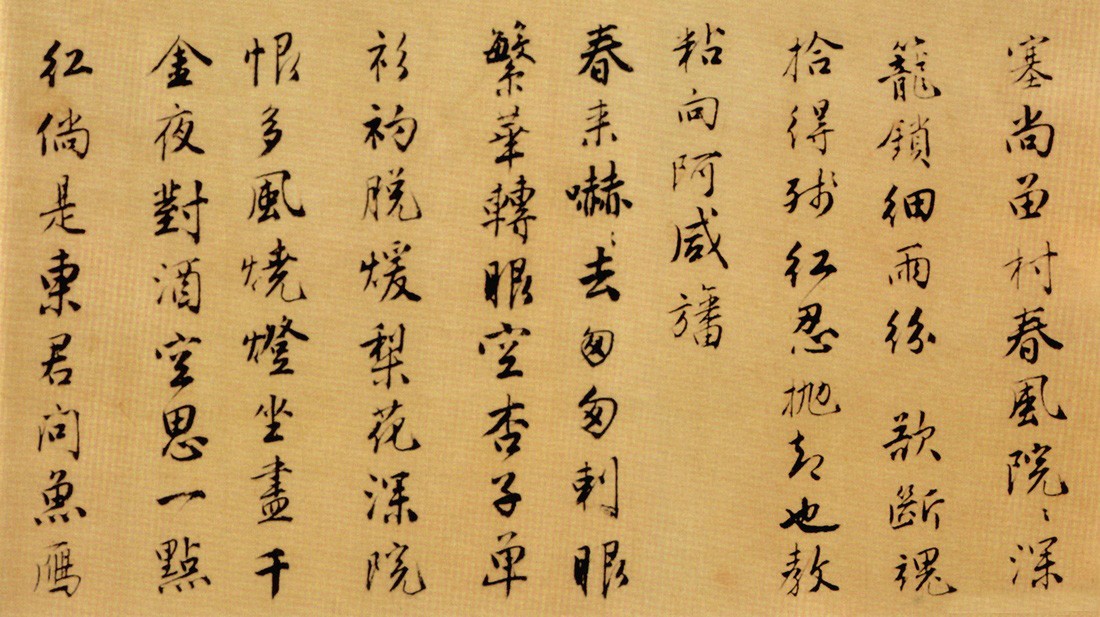
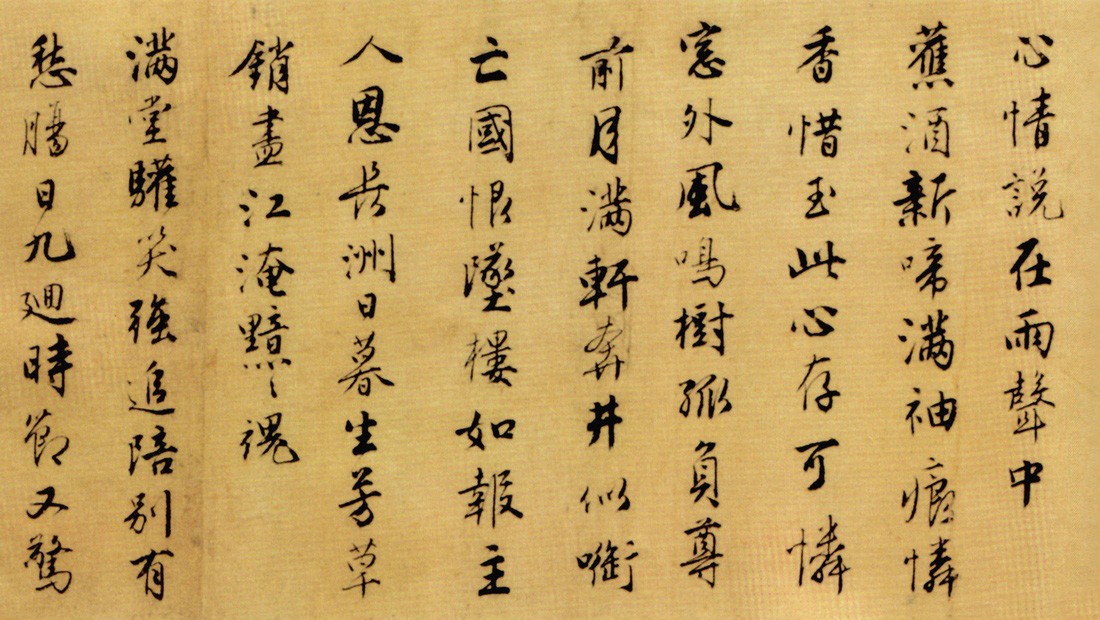
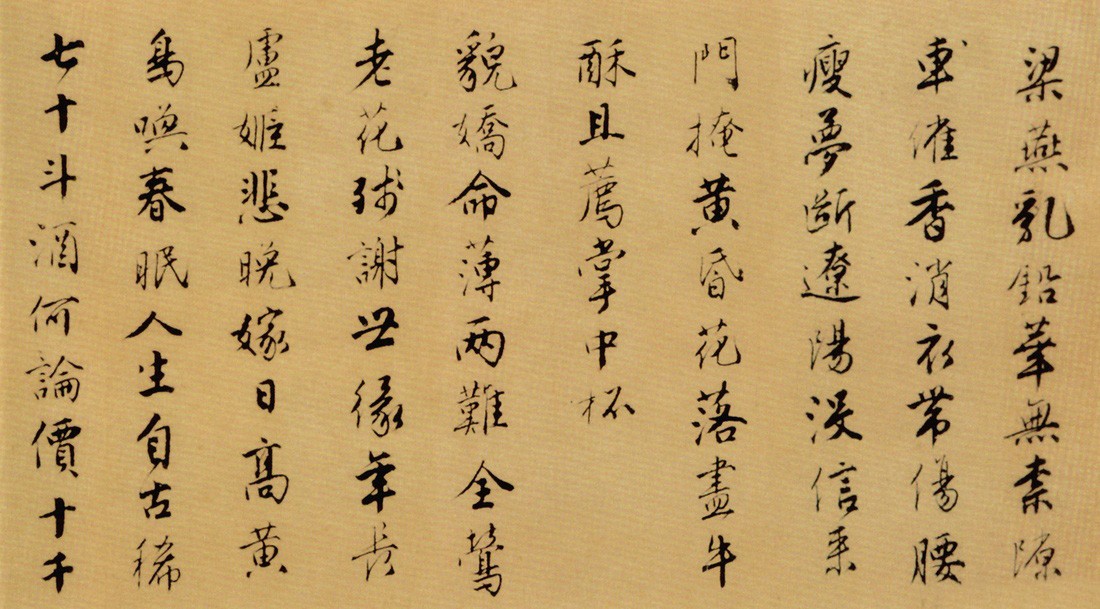
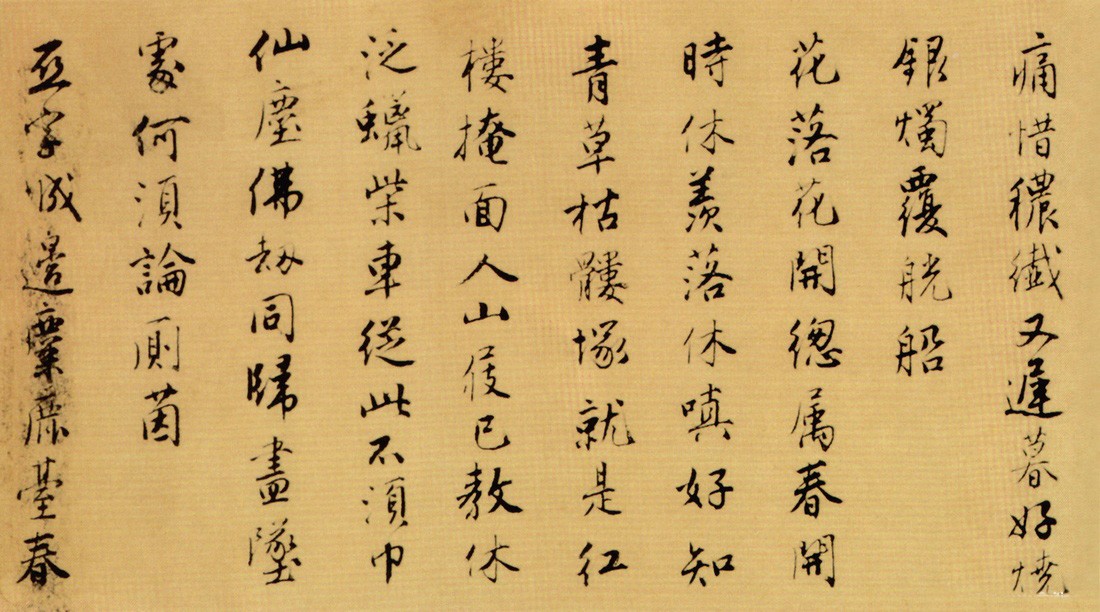
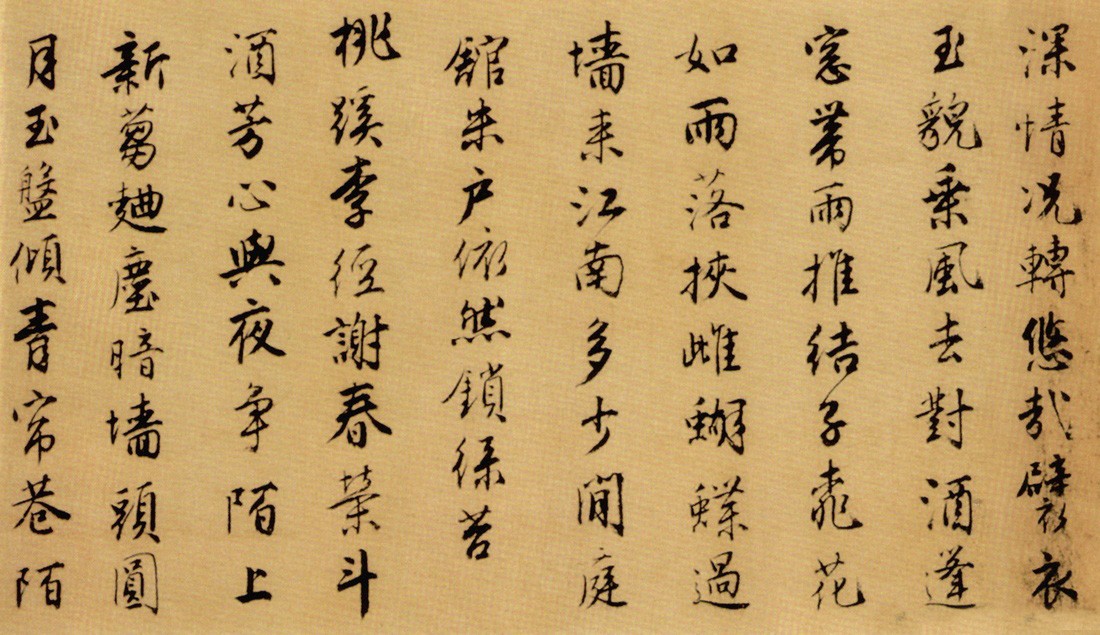
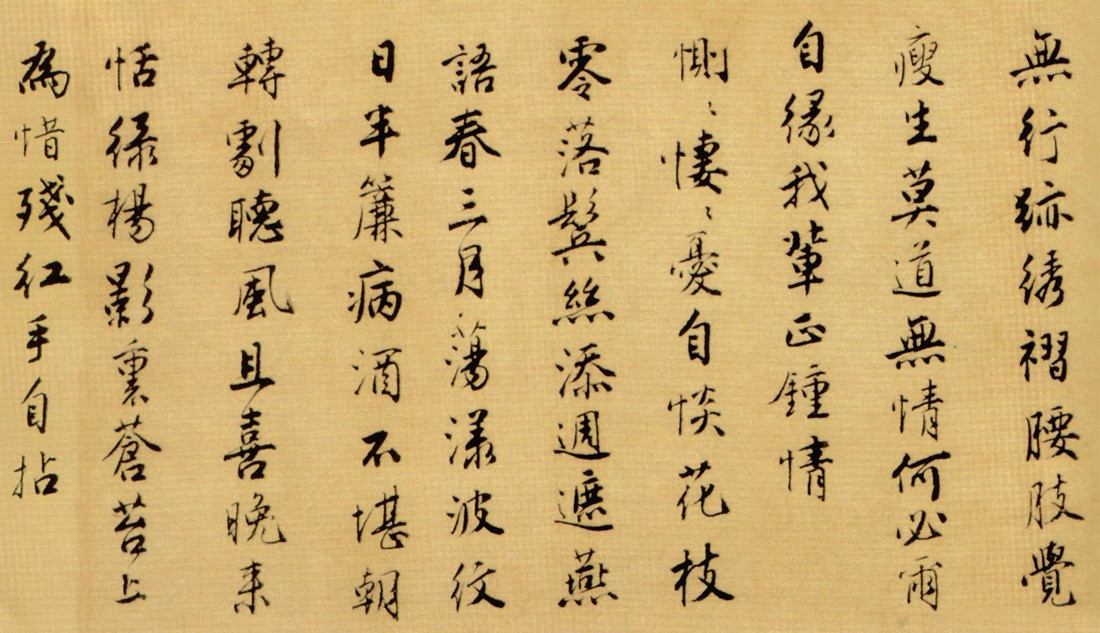
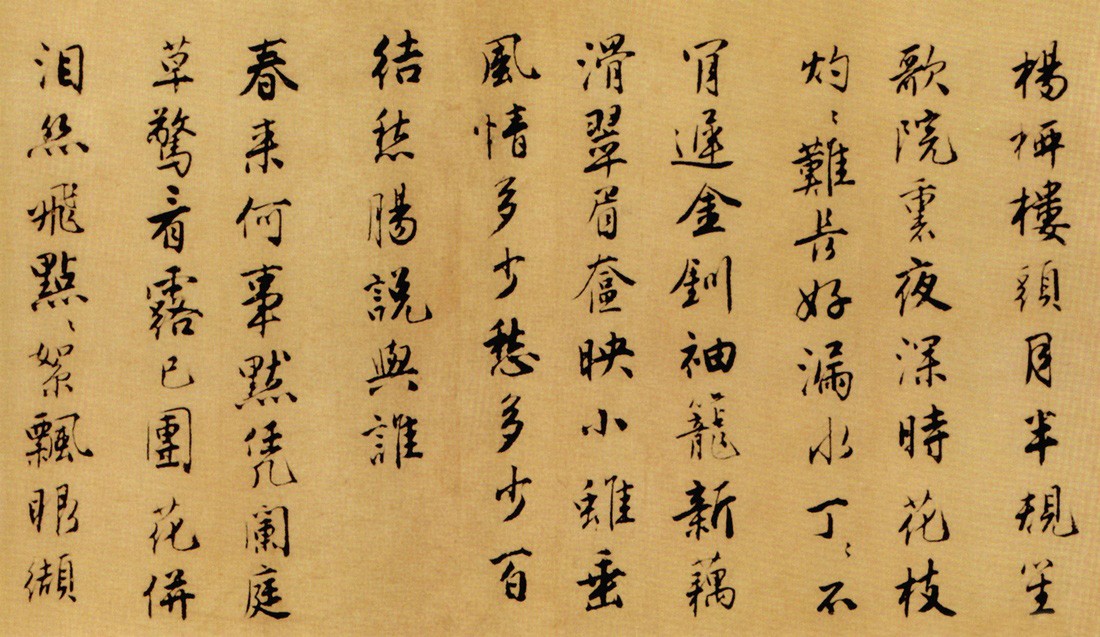
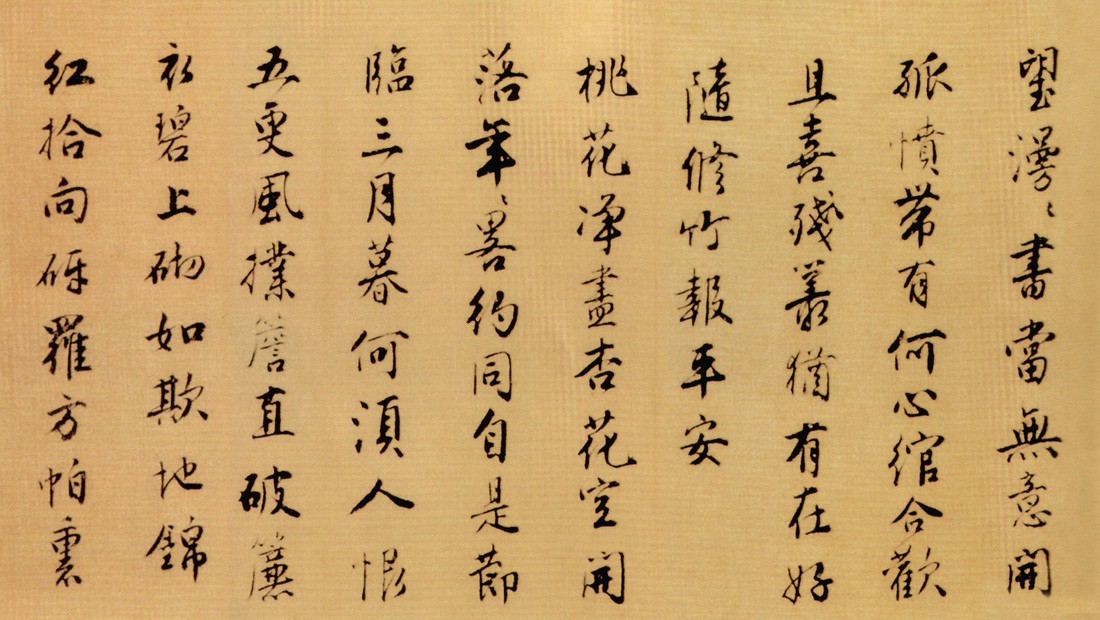
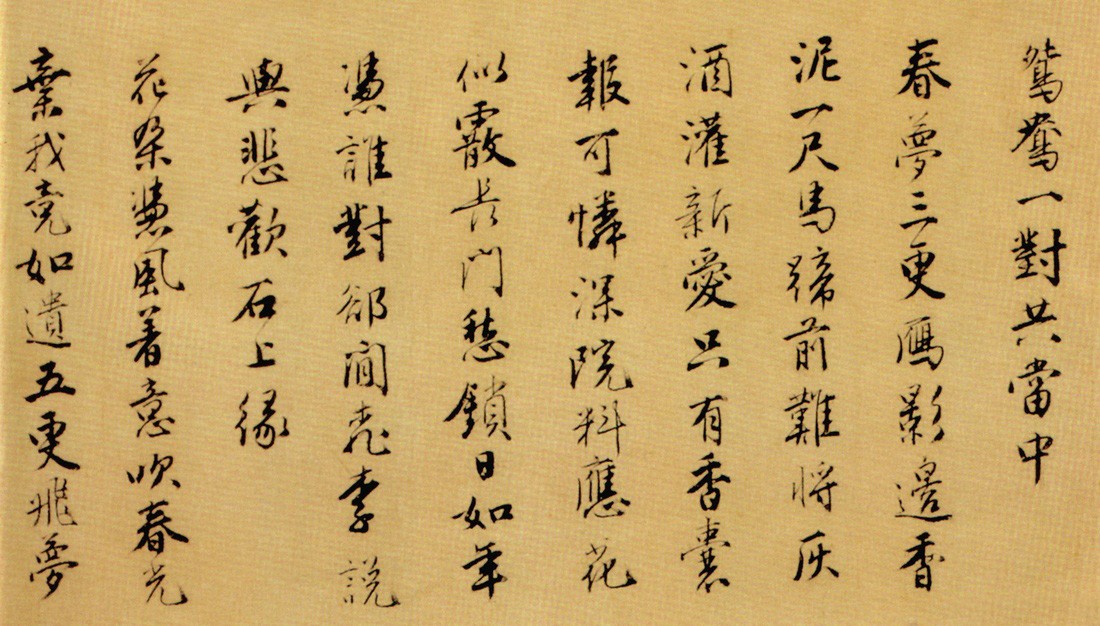
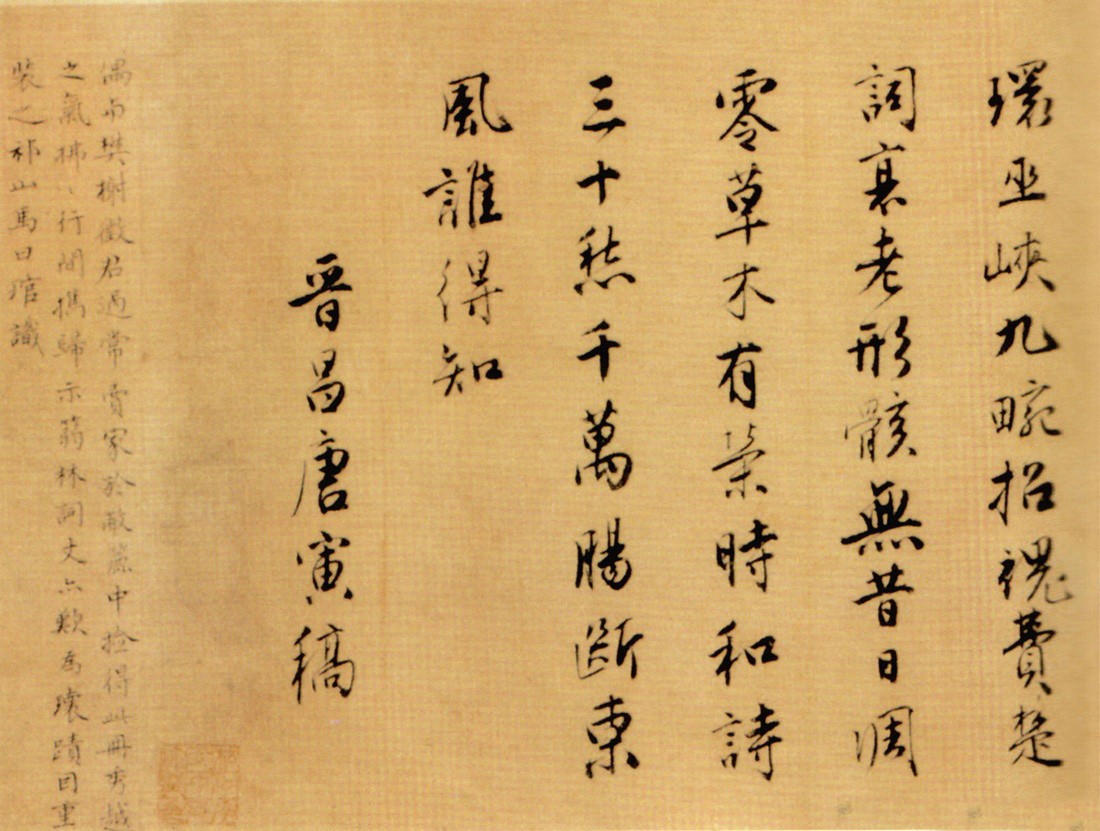
Collection of the National Art Museum of China, long paper scroll, 23.5cm x 445.3cm. This is currently recognized as the most mature pinnacle of art. It contains seventeen poems in seven rhymes. The end of the volume indicates that it was written on Qingming Day in the first year of Jiajing (1522), which was the year before Tang Yin died of illness. Although it is called the "Luohua Poems Volume", only seven of them are supplementary Luohua Poems, and the remaining ten are diffuse poems written by Tang Yin.
"Poetry Album of Falling Flowers" Collection of the National Art Museum of China


To sum up, there are currently four authentic copies of Tang Yin’s Falling Flowers poem, namely, the Suzhou Municipal Museum collection, the Liaoning Provincial Museum collection, the Princeton University Affiliated Art Museum collection, and the National Art Museum of China collection. There are many recorded poems about falling flowers in Tang Yin's books, such as "Vegetable Fragrance Hall Fa Tie", "Haishan Xian Guan Zhen San Ke", "Coral Net" and so on.
Appendix: A study of Tang Yin’s poems about falling flowers
Author: Sheng Shilan Reprinted from "Chinese Calligraphy" magazine, Issue 11, 2004
At the beginning of Tang Dynasty, his courtesy name was Bohu, and later he was named Ziwei. He was a native of Wuxian County (now Suzhou, Jiangsu Province). After taking refuge in the Buddha's vehicle, he named himself Liuru.
It is generally believed that Tang Yin's paintings are better than his poems and his poems are better than his calligraphy. Therefore, the titles of his poems and books have long been concealed by the names of his paintings, and there are not many poems and books left. According to Mr. Yang Xin's statistics, the total number of his ancient and modern poems, plus various supplements, is only about 600. ①The poem on falling flowers should be regarded as a well-deserved classic handed down from generation to generation. Tang Yin was very fond of his poem about falling flowers and wrote it many times. Poems and books complement each other and are wonderful.
1. The origin and main content of the poem about falling flowers
Tang Yin's poem about falling flowers is composed by He. In the spring of the seventeenth year of Hongzhi in the Ming Dynasty (1504), Shen Zhou wrote ten poems in seven rhymes about falling flowers, except for Tang Yin. Wen Zhengming, Xu Zhenqing and others all wrote harmonious poems. According to historical records, Tang Yin's thirty poems of harmony are included in various engravings of Tang Yin's poems and essays. The "Complete Works of Tang Bohu" edited by Zhou Daozhen and Zhang Yuezun included them in the original collection. However, according to the ink written by Tang Yin each time, there are many Luohua poems that are different from those included in the original collection, and have obviously been modified. According to statistics, there are seventeen songs with major differences, and "The Complete Works of Tang Bohu" has included them in the supplement. ②Therefore, there are actually a total of forty-seven poems on falling flowers. The poem "Tender and graceful, like crying and complaining" was widely praised at that time. Some people think that the content of the poem about falling flowers reflects the sentimental and decadent mood of feudal literati, and is therefore not worthy of consideration. In fact, this understanding completely misinterprets the profound meaning of Tang Yin's poem.
Tang Yin was gifted by nature and extraordinary in intelligence. He was ranked first in the imperial examination as a child and ranked first in the provincial examination at the age of twenty-nine. When he entered Beijing to take the imperial examination at the age of 30, he was imprisoned because of a bribery case involving Xu Jingfu. After that. Not only did he have no hope of fame and fame, but his livelihood was declining. He fell out with his wife and divorced, and soon he and his younger brother Shen lived together. It can be said to be extremely desolate. Tang Yin was thirty-five years old when he wrote the poem "Luo Hua". He was only five years away from being deposed in the imperial examination. He had just experienced a low point in his life. Of". ④Therefore, the poem about falling flowers seems to be indicative of spring, but in fact it is a reflection of his talent. To interpret them as frivolous and romantic works is to say that you have completely failed to understand them.
Many places in the poem express his feelings about the passage of time and the aging of time, which is the lingering rhyme of the "White Hair Poetry" when he was young. When Tang Yin was twenty-five years old, he discovered that he had "Chinese silk on his head" and could not help but feel "sad and excited", and encouraged himself that "the time for fame is to be strong". At that time, he was still young and vigorous, and his future was bright; now his situation has changed drastically. Although he lamented that everything happened in vain, it added a bit of a lonely hero's twilight atmosphere.
At the same time, the poem is also full of depressed emotions, with many hints of his own painful experience. "At the end of spring, in the midst of sorrow and sickness, the flower branches were exposed to rain and wind" is undoubtedly a portrayal of his experience; and "Many good flowers have fallen in the air, and they have never met the flower admirers" and other sentences use the image of "falling flowers". Expressed the sadness of not being able to appreciate his talent.
It is indeed sad and deplorable for Tang Yin's talent to encounter such misfortune. Only by understanding this background can we understand that his numerous sentiments about cherishing and lamenting flowers are by no means the idle moaning of scholar-bureaucrats, let alone the forced expression of sorrow for the sake of composing new words. There is a generous and intense feeling of grief and indignation in them. But it is worth mentioning that the poem on falling flowers is not just a sentimental work, especially the revised verses, which repeatedly reveal Tang Yin's new understanding of fame and wealth after his accident, and his understanding of the impermanence of life. A sign of future conversion to Buddhism. It is precisely because of the detached and broad-minded meaning contained in the poems that Tang Yin still preferred these poems of his own year even after his mood calmed down in his later years.
2. Comparison of calligraphy styles in various versions
Since Wang Shizhen commented in "Yanzhou Mountain Manuscript" that "Bohu's calligraphy has entered the Wuxing Hall." After "Zhao Bo Er", it is generally believed that Tang Yin's calligraphy was deeply influenced by Zhao Mengfu, and was more graceful but insufficient in strength and lacked change. In fact, Tang Yin studied calligraphy in many disciplines, with different emphasis at different periods. His calligraphy style varied greatly with his age. When Tang Yin was young, his calligraphy style was thin, regular in structure, rigorous in stippling, and he had a good foundation in Tang regular script. And the couplet poem he wrote impromptuly when he was 41 years old in the fifth year of Zhengde (1510) was deeply inspired by Li Beihai's writing style. The body posture is slanted and the pen is strong. During this period, he also wrote rich and round running script, but it was only in his later years that he truly transformed his strength into graceful postures, integrated the strengths of various schools, and revealed his own style.
Tang Yin's works are particularly easy to be compared to Zhao Mengfu because of their beauty and ease of movement. In fact, there is a certain difference between Tang Shu's solemn and unrestrained hermit spirit and Zhao Shu's brilliant and wealthy spirit. The characteristics of Tang Yin's calligraphy, which are soft yet strong, graceful yet sharp, are relatively more prominent in the Su Bo and Princeton editions. These two collections are handsome in appearance and very similar in calligraphy style, and both have a style that favors regular script. The structure of the characters is relatively neat, and each character is mostly independent, with few connecting strokes. The pen is round and elegant, and the stippling is quite accurate. For example, the words "一", "十", etc., are written against the front, then back to the front, and the words are explained clearly, showing excellent regular script skills. The rhythm is quite relaxed, and the combination of thickness, thickness, and length is extremely natural, without any trace of artificiality. The single stroke of a diagonal stroke on the radical side is bold and quick, and clearly has Li Beihai's brushwork style, with clear bones. The arrangement of the composition is also natural. Each verse occupies eight lines of space. The number of characters in each line is not consistent, but the vertical line in the middle is straight, giving a strong sense of form.
The calligraphy style of the "Luo Hua Shi" volume in the collections of the Liaoning Museum of China and the National Art Museum of China is more grassy. The writing style, wording and composition are all different from the previous two collections. For example, the word "send" in the first sentence of "severe" in the Liaobo Collection has been simplified and is knotted in cursive style. When using the pen, most of the edges are exposed and the starting strokes for horizontal strokes are mostly slightly pointed, which brings greater freedom in writing. There are a large number of continuous brushstrokes in the Liaobo Collection and the Guan Collection of Chinese Art. The writing flows smoothly, and a piece of magic flows away. For example, the last sentence of the poem "The eyebrows are cocooned by clusters" in the collection of Liao Bo is almost a stroke of writing, with seven characters written in one go, and the strokes flow down the stream. The same is true for the treatment of this sentence in the National Art Museum of China. This can show that the Liao Bo collection is indeed the work of Tang Yin in his later years. In addition, there are also very exaggerated brushstrokes in the Liaobo collection. For example, the character "to" in "重来" has an exaggerated vertical shape at the end of the stroke. Very lyrical. The last stroke of the character "Xuan" could have been made into a dot, but Tang Yin was written as an exaggerated vertical stroke, which gave people a strong shock.
Such proficient skills reached the level of proficiency in the volume collected by the National Art Museum of China that he wrote a year before his death. The writing strokes in this volume are slightly fat and the structure is flat. Compared with the sparseness and elegance of the two early collections, it adds a bit of age and emotion. Due to the speed of writing, there are skips and omissions, which are randomly added to the edges of the lines, indicating that the writing process is entirely driven by emotion. The flow of strokes is like clouds and flowing water, continuous and continuous, giving people a powerful and stretched momentum. It contains ten romantic poems, the content of which is more vicissitudes of life than the poems about falling flowers. Especially the last song, "Friends are scattered, the robe is cold, the wind and snow are blowing, and the ice in the earthen jar" is soaked in desolation, and it is also written in a gloomy and desolate way.
4. The reason why Tang Yin wrote poems about falling flowers many times
Tang Yin repeatedly wrote poems about falling flowers many times throughout his life, which had a certain relationship with the literati atmosphere at that time. On the one hand, the Suzhou area in the mid-Ming Dynasty was a gathering place for literati and refined scholars. Like-minded teachers and friends frequently exchanged poems and paintings with each other. It is common for people to write their own poems and give them to others, write other people's poems, or add poems and postscripts to other people's paintings and calligraphy. Among Tang Yin's handed down calligraphy and painting works, many were painted in response to invitations, and some volumes are marked as gifts to or for someone. Therefore, he wrote poems about falling flowers many times, possibly giving them to different friends. On the other hand, it was also a common practice for literati at that time to record their favorite works repeatedly. For example, Zhu Yunming wrote his "Twenty Poems on Drinking with Tao Yuanming" many times, and Wen Zhengming, who wrote his poems on falling flowers with Tang Yin and Shen Zhou, later wrote his poems on falling flowers many times.
Of course, Tang Yin's choice of falling flower poems as the content to be written repeatedly has his own internal driving force. If the first time he wrote the poem about falling flowers, it was out of emotion and expressed the anguish and troubles of his failure in the examination, then his subsequent writings had different sustenance. "Falling flowers" is a symbolic image in Tang Yin's poems. It not only uses flowers to metaphor people, but also uses flowers to express feelings. "Falling Flowers" embodies Tang Yin's complex and rich life experience. In the poems of the first time and Shen Zhou. His mood is relatively low, and he is more sad and sorrowful than complaining. The emotion of some poems is very negative, such as "The wind and rain in the fifth watch bury Xi Shi". After reading it, Chen Jiru said: "Tang Bohu's poem about falling flowers, until the sentence "The wind and rain in the fifth watch bury Xi Shi", I felt short of breath. 』⑥ From a technical point of view, "The Wind and Rain Buried Xi Shi at the Fifth Watch" is a meticulous imitation, but it has not yet reached the natural perfection of Xu Changguo. 』⑦ By the first year of Jiajing (1522), Tang Yin had experienced more ups and downs and hardships. The joy of spring breeze in his youth had long disappeared. Coupled with old age, illness, and poverty, he had reached the end of his life. He himself is like a fallen flower, about to die and return to earth. At this time, due to more experiences, I no longer wrote poems like "The wind and rain buried Xi Shi in the fifth watch", but replaced it with desolation and desolation, and issued "A dream of ten years, a beautiful dream," They all put their thoughts into the waves." And "Two items have not been planned, and the land is lost to Guo. After one meal, the porridge is divided according to the monks." "I came drunk to test the virtues of the Qian family, but I have not exhausted all the rough and heroic spirit" and other sentences, it is really that all the beauty has been wiped out, and the true body is revealed. "Sold out all the rich and powerful" means that his state of mind has become dull and calm, and he is no longer "the one who ends up being a slave to fame and fame", while "Qi Wei Ceng" means that he has not lost his confidence in life. Therefore, although the volume of poems on falling flowers in the collection of the National Art Museum of China was written in his later years, it does not show signs of decadence. The entire volume of this collection is about four and a half meters wide, and the entire text is smooth and surging with the vitality of life. Tang Yin writes and sings about falling flowers, which are songs about the life that is about to pass away. Therefore, reading his poems and admiring his buildings, one can still feel the brilliance of his life.
Explanation of the Falling Flowers Poetry Album:
The spring is gone in an instant, and the wealth and garden are washed away from poverty. I would like to ask the shepherd boy if he should set up some wine and try to taste the plums, which will produce benevolence again. If you deceive the beautiful lady for a soft dance, it is difficult to protect the lingering fragrance and the laughing tree god. It is expected that Qing Xie will accompany each other hand in hand, and they will become Yan Mian's people every day.
The setting sun is dim and long, and the spring breeze turns around again. Accusations are heard in the sky, and all the rouge is wasted. The pouring rain covers three feet of mud, and the beautiful woman is embroidering half a hook around the tree. The colors are always dreamy, adding to the sadness in the mirror.
The spring breeze disappears in a moment, and the flowers are gone. The new wine will soon turn green in the cup, and the faded face will be transformed into the red in the mirror. Jueying is not seen stealing incense from the rafters, and falling into the mud is turned into chasing a smelly husband. The body gradually declines like this, the tree and the tearful eyes both wither.
In the season when silkworms are busy breaking the black trees, the flower branches are as rich as red ones. It seems that the cold food and spring have no owners, and the butterflies flying over the neighbors have their own interests. Even if money piles up the Big Dipper, it is difficult to bury Xi Shi in wind and rain. In the early morning, I slept on the bed, and a wisp of smoke and tea flowed on my temples.
Sitting and watching Fang Fei in boredom, Qu taught the screen to show the wind. Yamen's honey is fragrant and sticky when cooked, and Liang's nest becomes moist and red. The beauty of the country is so pitiful that it is hard to find it again. Why can’t the wine glass be empty? I can't bear to watch the horses flying west and east under the wheels.
Cui Huikong describes the truth in the mirror, but it is difficult to convey the spirit in Luoshui. The beauty of the country means that one's life is poor, but the peach blossoms will appear again in spring. There are no brocade tents surrounding the golden valley, and green shoes are everywhere treading the winding dust. I walked around the tree a hundred times and said to myself, who will be the hooker next year?
The sky is dark and the blue clouds are horizontal, and the garden is light with purple swallows. The peach leaves are uneven, who asks for the ferry, the apricot blossoms are scattered and I remember the title. The moon is bright, dogs are barking at night in the village, and orioles are singing after the rain, and the leaves are all over the city. If people don't come back and spring goes away, who will they join arms with and sing happily?
The white weeping willows are blooming in the new sunshine, and the purple-backed duckweed is growing thinly. In March, couples riding on phoenixes were looking for beauty, and they all sang and walked on the sand. Turning off the lights in the courtyard hurts the swallows, and the drizzle dampens the warbling orioles on the pavilion. Don't ask Dongjun to complain about your grievances, for your spring dreams will not be clear.
What's going on in the Spring Dynasty? The grass in the courtyard is shocked and exposed. The flowers and tears are flying, and the fluttering eyes are looking at the sky. The book should not express loneliness and anger, but it should bring joy and joy. And I am glad that the remaining bushes are still there, so that I can repair the bamboos as a sign of peace.
The peach blossoms are all gone, and the apricot blossoms are empty. They bloom and fall in the same way every year. Since the festival is approaching the evening of March, why should anyone hate the fifth watch wind. The fluttering eaves are straight and broken, the curtains are green, and the top bricks are as bright as brocade on the ground. When you pick it up, you can find a pair of mandarin ducks in the square paris.
I feel sad and sad, and I feel lonely. The flowers and branches are scattered and my hair is added to my temples. Zhou Zheyan talks about spring in March, and the ripples are half-curtained. I can't stand the drama of being sick and drunk, but I listen to the wind and like to stay late at night. In the shadow of the green poplars, on the green moss, red hands pick themselves up to cherish what is left.
The moon is half full in the Yangliu Tower, and it is late at night in the Shengge Courtyard. It's hard to grow flowers when the branches are burning, and it's too late for water leakage. The golden armbands are made of new lotus roots, and the green eyebrows reflect the small drooping flowers. How much is the style and how much is the sadness, who can I talk to about all the worries?
Li State and Fan Xiang recall old travels, and Peng Feiping is overwhelmed with sorrow. Dressed in haggard Maochai wine, March is full of sorrow as spring hurts. It is difficult to give away the poor clothes with care, and it is like leaving the sleeping shoes to wither. The beautiful spring trees are not what they were yesterday, the green grass is empty and there is a mound buried in the earth.
The apricot petals and peach must be swept into piles, and the youthful white hair feels decadent. Clams are on the market with a new flavor, and I teach people to wash their cups again. I can't bear to sing the song of Li to send the spring away, but I regret that the Jie drum will be clear to remind me. If you don't make money, I will grow old. Do you know if I can make money in the next year?
Don't praise her for her beauty, but look at the Yi family for its decline. Zhaojun met Mao Yanshou by chance, but Emperor Yang could not keep Zhang Lihua. The deep courtyard is youthful and empty, and the embankment is red and the The sun is setting to the west. There are small bridges and flowing water in the quiet villages. There are no warblers or dogs or frogs.
The whole house is full of laughter and forced to accompany each other, don't be sad nine times a day. The season is startling again, and Liang Yanru has no choice but to rush. Xiangxiao's clothes hurt her waist and made her thin. She dreamed about Liaoyang, but no letter came from her. The door is closed, the flowers have fallen at dusk, and the cow is crispy and the cup is in the palm of your hand.
At Milu Terrace on the edge of Yazi City, the situation in spring is very good. The ruffled clothes and beautiful appearance are blown away by the wind, pushing the rain against the wine tent window. Peach blossoms are falling like rain, carrying female butterflies over the wall. There are many leisurely gardens in the south of the Yangtze River, and the houses are still covered with green moss.
The peach blossoms and plum blossoms pass by Chunrong, and they fight over wine and fight at night. The new road on the street is dark with dust, and the full moon on the wall is leaning against the jade plate. There is no sign of movement in the green curtain alley, and the waist and limbs are embroidered and thin. There is no need to be ruthless, because I am in love with you.
There are clusters of beetles growing out of them, and when they are flooded, they lean against the curved railing alone. The green tombs have been empty for thousands of years, and they have been so heavy that they can only write poems in Xuandu. The fragrance chases the horse's hooves and returns to the ant colony, and the shadows and insects' arms pick up the spider silk. Xunfang paid off the New Year's debt, and saw the branches full of shadows.
Fangfei is thankful for a new year, and she can give her today no eight-doubles. *It's a mistake to throw away the beauty of the country, but the fate is so light that you won't meet the gold buyer. The cuckoo sings at night in the bloody mountains, and the ghosts of butterflies wander under the trees in spring. Color is emptiness, emptiness is color, and desire is controlled by desire, greed, and anger.
The beautiful appearance and poor fate are in a dilemma, and the old and beautiful warbler has lost her fate in the world. The elder Lu Ji is sad to marry late. The sun is high and the yellow bird calls for spring sleep. Life has been rare since ancient times. How can a fight of wine be worth ten thousand? It's a pity that the slender and old age is so long that I would like to burn silver candles to cover the boat.
It is spring when flowers fall and flowers bloom. When they bloom, there is no need to be envious or angry. I know that the Green Grass Skull Tomb is the man hiding his face in the red building. The sandals have been taught to wear rags, and chariots no longer need towels. Immortals, dust, and Buddhas will die together, so there is no need to talk about the place where they fell.
The sound of plowing can be heard at the short firewood gate, and the fragrance of orchids can be heard in the pheasant garden. When Xizi returned to the lake, there was a well, and when Zhaojun left Saishan, he stayed in the village. The courtyard of Chunfeng Courtyard is deep and locked, and the drizzle is falling one after another. After losing Can Hong, she reluctantly gave up, but also learned to stick to A Xianhan.
The new cry of banana wine fills the scars on the sleeves, and I cherish the fragrance and cherish the jade in my heart. Pity the wind-swept trees outside the window, let down the full moon in front of you. Running into a well is like expressing hatred for the country's destruction, and falling from a building is like repaying the kindness of one's master. Fragrant grass grows at dusk on Cheung Chau, and the dark souls of the river are wiped out.
Shrike flies east to Yanxi and flies to the west. The prince of Nanpu complains about being lost on the way. The birds call for spring break and carry people away, and the rain makes up the flowers and crows in the corner. The green and The lush garden closes the stringed pipes, and the long door is locked during the day and the maidservants are waiting. The butterflies turn over the remaining dreams, and the delicate hands of the winding rails carry them together.
The blue shoes and stockings are gone together, and the white butterflies and wasps are each worried. As we approach old age, our feelings change, and we will rest only after we die. Jiao* (the word "suspicious" is missing) the The sun and the moon have no long-term strategy, and the wine and tea have worries about the near future. A song of mountain fragrance is silent in spring, and the blue clouds merge together at dusk across the red building.
The arrival of spring scares away the rush, the dazzling prosperity is gone in an instant, the apricots have just taken off their single shirt to keep warm, and the deep pear blossom courtyard hates the wind. Burning lamps and sitting for a long golden night , thinking about the red wine. If Dongjun asked Yu Yan, his mood was revealed in the sound of rain.
Wuwuwujiao rises from the spring city, and the east wind shakes the ground. The lamp shines on the eaves, the flowers are blooming and falling, and the crows roosting in the trees in the courtyard are still startling. The beauty will not stay for the old man (click to go), and the green wine will not leave the cup and the face will be full. I compare myself silently in front of the mirror, my hair is winning for another year.
In the spring dream, beside the shadow of wild geese, there is a foot of fragrant mud in front of the horse's hooves. It is difficult to pour gray wine into new love, only a sachet can repay pity. The flowers in the deep courtyard should be like sleep, and the long gate should be locked up like a year. Who can say that the idle peaches and plums are related to the joys and sorrows stone?
The flowers blow according to the wind's will, and the spring light abandons me as if it were left behind. At the fifth watch, flying dreams circle the Wu Gorge, and the Nine Wan summons the souls and spends Chu's poems. The aging body is no longer the same as before, and the grass and trees are withered and prosperous. Thirty years of poems and thousands of sorrows, who knows the spring breeze that breaks my heart.

